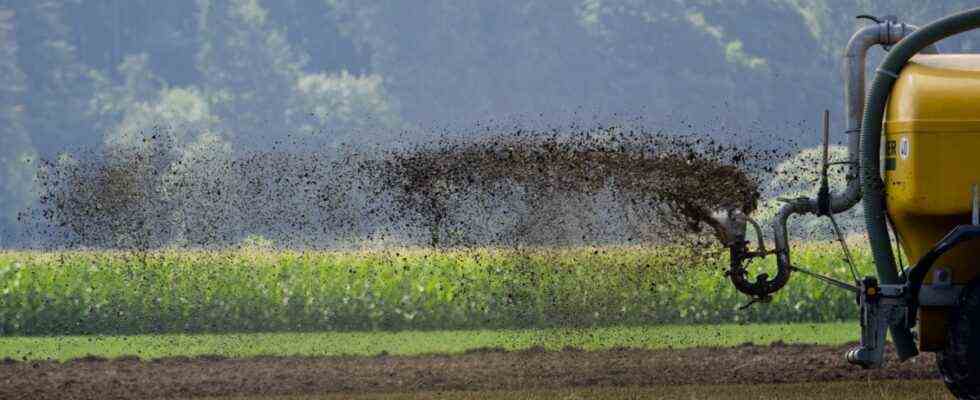There is no doubt that the drinking water in Bavaria, which mainly comes from the groundwater here, is excellent. But that does not mean that the municipal utilities have no problems with the groundwater. The Rottenburger Group, for example. The small water association supplies around 40,000 people in the regions of Landshut, Kelheim and Regensburg with drinking water. For years he has been struggling with the fact that the groundwater there is heavily polluted with pollutants from agriculture. That is why he has already had to close four wells, and two more are about to close. The replacement wells cost twelve million euros – a lot of money for such a small supplier. It is hardly surprising that Marlene Gruber from the Rottenburger Group demands that the Free State do a lot more than before to protect the groundwater. Especially since the climate crisis will exacerbate the situation for utilities.
Gruber can rely on the expertise of the professional world for your request. This was shown by a hearing on groundwater in Bavaria in the state parliament on Thursday. All experts – whether from specialist organizations, universities or research institutes – agreed that the previous protection of groundwater was insufficient and had to be significantly improved. First and foremost, this concerns the pollutants from agriculture – the nitrate pollution, which results from the excessive application of liquid manure and artificial fertilizers, but also residues from pesticides. In two wells belonging to the Rottenburger Group, for example, the measured values for atrazine have exceeded the limit. The once widespread herbicide has been banned for 30 years. “But groundwater has a long memory,” said Berthold Niehues from the German Association for Gas and Water in front of the MPs. “Although its application has been banned since 1991, it is still a major pollution of the groundwater.”
It is similar with nitrate. The pollutant pollutes the groundwater in many places – especially in Lower Bavaria, North Swabia and Franconia. Nitrate is important for plants to thrive in fields and pastures. But in high concentrations it is a danger to flora and fauna. And for people. Nitrate is suspected of causing cancer. For years, a limit value of 50 milligrams of nitrate per liter has been in force across the EU for drinking water. It is now being torn at many groundwater measuring points in Bavaria. Likewise, the precautionary value of 37.5 milligrams per liter, from which the water supplier must do something against the nitrate pollution of the groundwater. The Ministry of the Environment assumes that around 30 percent of the groundwater in Bavaria is so polluted with nitrate that it does not meet the EU requirements. The reason is always the same – the experts at the hearing also agreed on this: the farmers apply far too much liquid manure and artificial fertilizers and thus nitrate. Groundwater naturally only contains up to ten milligrams of nitrate per liter.
The problem should have been resolved since 2020. A good year ago, the federal and state governments agreed on the designation of so-called red areas, where the nitrate concentration in the groundwater is too high, and on a new fertilizer ordinance. For example, farmers in the red areas now have to fertilize a fifth less than before, observe stricter blocking periods in the cold season and more. The red areas add up to 330,000 hectares or ten percent of Bavaria’s agricultural area. The farmers have fought massively against the red areas. But there was also massive criticism from the water utility right from the start. From their point of view, the red areas are much too small to have any effect on groundwater protection. And the new fertilizer guidelines are too lax for them. In the meantime, providers can feel confirmed. The EU Commission recently initiated new formal proceedings against Germany because, in their view, the federal and state governments continue to do far too little to protect groundwater.
Most of the experts at the hearing shared this view. Even Maximilian Zinnbauer from the Thünen Institute was rather skeptical that the red areas and the new fertilizer ordinance could achieve the intended effect. You have to know that the Thünen Institute is an authority of the Federal Ministry of Agriculture and is traditionally considered to be agriculture-friendly. According to Zinnbauer’s modeling, the fertilizer surpluses can be reduced by 25 to 55 percent across Bavaria thanks to the new specifications. That is a step forward. But it also means that far too much fertilization continues. And from the point of view of the experts, even this modest success can only be achieved if the new requirements are implemented one-to-one. That should be a problem. Because the control staff is missing for this, it was said by the experts in unison. “However, deficits in enforcement will have a negative effect on the effectiveness of the regulation,” says the dry bureaucratic German in the Thünen Institute’s paper.

